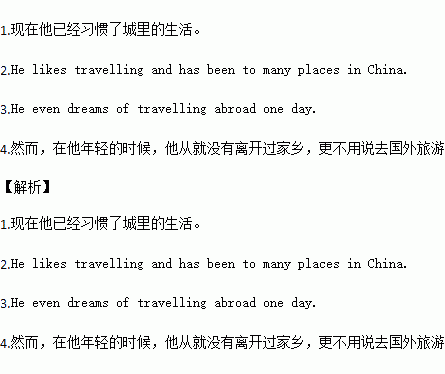题目内容
Section C (8 marks)
Directions: Read the following passage. Answer the questions according to the information given in the passage and required words limit. Write your answers on your answer sheet.
If there were a literary award bigger than the Nobel Prize, Alice Munro would probably win that, too. Munro,82, was awarded literature’s highest honor, respected by the Nobel committee as a thorough but forgiving chronicler(事件的记录者) of the human spirit.
Among her best-known is The Bear Came Over the Mountain, about a woman who agrees with her husband that she should be put in a nursing home. The narrative begins in a relatively tender, traditional mood. But we soon learn that the husband has been unfaithful and doesn’t always regret it. The wife, meanwhile, has fallen for a man at the nursing home. Munro won a National Book Critics Circle prize in 1998 for The Love of a Good Woman and she is also a three-time winner of the Governor General’s prize, Canada’s highest literary honor.
She received a scholarship to study at the University of Western Ontario, majoring in journalism, and was still an undergraduate when she sold a story to CBC radio in Canada. She dropped out to marry a fellow student, James Munro, had three children and became a full-time housewife. By her early 30s, she was so frightened and depressed that she could barely write a full sentence.
Her good fortune was to open a bookstore, in 1963. Inspired by everything from the conversation of adults to simply filling out invoices(发票), she saw her narrative talents resurface. Her first collection, Dance of the Happy Shades, came out in 1968 and won the Governor General’s prize.
Her books having been sold more than 1 million copies in the U.S. alone, she has long been an international ambassador for the short story. Critics and peers have praised her in every way a writer can be praised: the precision of her language; the perfection of detail; the surprise and logic of her storytelling; the graceful shifts of moods. So, she is the kind of writer about whom it is often said-no matter how well known she becomes—that she ought to be better known.
1.What do we know about the woman’s husband in The Bear Came Over the Mountain? (No more than 10 words) (2 marks)
________________________________________
2.Why did Munro stop her study at the University of Western Ontario? (No more than 4 words) (2 marks)
_______________________________
3. What happened to Munro in 1963? (No more than 10 words) (2 marks)
_______________________________
4.What is the main idea of the passage? (No more than 10 words) (2 marks)
_______________________________

